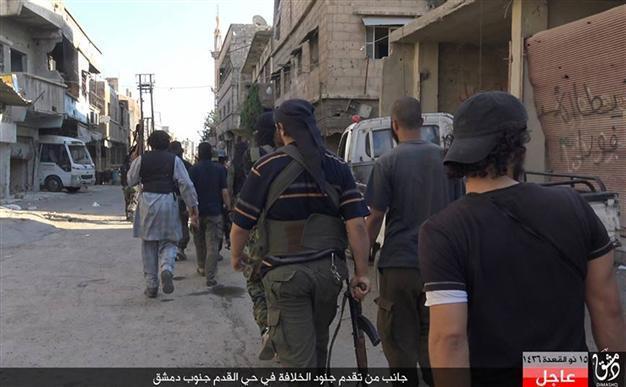Turkey puts travel ban on 20,000 foreign fighters
ANKARA

In this picture released August 30, 2015 by the Rased News Network, on a Facebook page affiliated with the Islamic State group, Islamic State militants walk on a street in the Qadam neighborhood of Damascus, Syria. AP Photo
Turkey has slapped a ban on 20,000 suspected foreign fighters, preventing them from heading to Syria and Iraq, Foreign Ministry spokesperson Tanju Bilgiç said Sept. 2, a day after one soldier was killed another went missing in a suspected attack by the Islamic State of Iraq and the Levant (ISIL) on the Syrian border with Kilis.
Turkey has deported more than 2,100 foreign fighters to their countries, Bilgiç told reporters, adding that more than 3,700 had been subjected to interrogation at special risk analysis units at airports. Some 1,450 of them were sent back after being declared suspects, he added.
Turkey has long been criticized by the international community for tolerating foreign fighters passing through its territory to join ISIL in Syria.
In response, Turkish officials have stressed the failure of European Union countries to halt the travel of foreign fighters and called on them to intensify intelligence sharing with Turkey on alleged jihadists. Ankara describes the foreign fighter issue as “complicated” while calling on EU countries to stop foreign fighters as they leave their own countries.
The statement came a day after a Turkish soldier died and another went missing on Sept. 1 following cross-border fire from ISIL-held territory in neighboring Syria, local officials said.
They told Reuters that a third soldier was lightly wounded in the incident on Sept. 1 in the southeastern province of Kilis, which abuts territory that has been controlled by the militants for months.
“One Turkish soldier is missing, and we’re trying to find out where he is,” an official told Reuters. The governor of Kilis, Süleyman Tapsız, told journalists outside Kilis hospital that one soldier had died and another was unaccounted for.
Turkey has been a reluctant partner in the fight against ISIL, but in July stepped up its involvement, launching air strikes and opening its air bases to the U.S.-led coalition.
The missing serviceman raised the specter of another possible hostage scenario involving Turkish citizens.
Last year the jihadists seized 46 Turkish citizens and three others in the Iraqi city of Mosul.
The hostages were released unharmed after more than three months, but fears for their fate were seen as a key reason for Ankara’s reticence to engage in anti-ISIL operations.
Turkey has a 900-kilometer-long border with Syria and has borne the brunt of the refugee crisis sparked by the Syrian civil war, hosting around 2 million people who have fled the fighting.
Diplomats say Ankara’s decision to launch attacks against ISIL has increased the risk of reprisals.
Turkey’s security headache has further worsened since the July collapse of a cease-fire with the outlawed Kurdistan Workers’ Party (PKK), sparking a wave of tit-for-tat attacks across eastern Turkey that have killed hundreds of people.
On Sept. 1, a doctor and a policeman were killed in separate PKK attacks. PKK militants also launched an attack against a military base in Şırnak province, wounding at least two soldiers, according to state-run Anadolu Agency.
